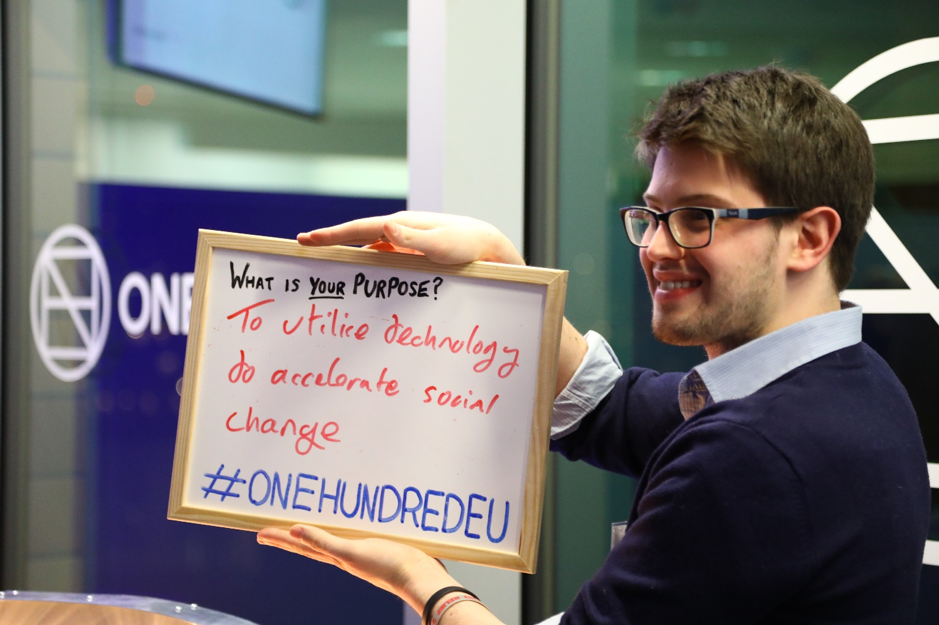
Nearly 50 years ago the birth of the internet in 1969 promised the utopia of a connected world, where the exchange of goods and ideas would herald a new era of efficiency, tolerance and growth. Some of these promises have been fulfilled, but many threats to society have also been revealed. How to deal with these challenges was the topic of conversation when ONE HUNDRED launched their European Hub at an event with a gathering of organisations and keynote speakers talking about business purpose in the digital age.
This era of 24 hr news and instant information flow has had unexpected consequences. Trust in our governments, business, “experts” and even charities is wearing thin as they seem to stagger from scandal to scandal. Failing public private partnerships, sexual harassment lawsuits, excessive bonuses and even the global financial crisis are increasing the focus on institutions that were once the bedrock of our society.
How can business respond?
Big business is often the key recipient of this un-focussed ire, with capitalism seen by many as the root of society’s problems. However, in times of increased debt and failing public services, business is also seen as the answer, with notable beacons like Elon Musk at Tesla picking up the ball that has been dropped by government and trying to envision a better future.
Perhaps as a response to this, the ONE HUNDRED is an agency that pulls together partners from across Omnicom Group to “empower organizations to make a sustainable impact by connecting their people, passion, and purpose”. At the 100 Europe Hub launch event their Managing Partner, John O’Brien MBE set the agenda for the day, calling for “clarity of purpose”, a noble effort to “help organizations turn their philanthropic ambitions into an actionable purpose, and drive tangible results”
With an increasingly savvy society becoming cynical about organisations motives, indiscriminately donating as a form of social tax isn’t resonating with consumers. Paul Drechsler CBE, President of the CBI and chair of Teach First opened the event with a positive view of business giving back to society, with examples stretching back to the early 1900s with Cadburys idyllic “Bournville”, built for the benefit of their workers.
Nowadays customer relationships are more complicated. The CEO of Unilever recently defied shareholders by threatening to pull their adverts from Facebook which he blames for “an environment where our consumers don’t trust what they see online”. For Paul Drechsler, “a lack of trust is a failure of leadership”, with trust a tangible risk which is becoming increasingly important in the boardroom.
Changing society, changing needs
When we talk about a changing society, it is the new generation of “digital natives”, born into the digital landscape of computers and social media that are driving the dialogue. Stephen Greene the CEO of Rockcorps talked at the event about how “collectively this is the most comfortable time to be alive, but the millennials don’t feel this way”. It is this group that is going to have to live with the consequences of the preceding 150 years of greed and overconsumption and they are worried about it. For this generation, Stephen says, purpose and authenticity is just something that they do and they expect their products, services and jobs to reflect this world view.
Ben Fletcher, President, of Clarks Shoes, UK & Europe spoke at the event about how he sees this challenge of truth and authenticity as an opportunity to galvanise staff, shareholders and consumers. As one of the largest employers in the UK, Clarks has set about defining their purpose as “comfort and movement” aligning with their key function as a producer of shoes, but also alluding to something broader and more central to their mission of contributing to a more comfortable and mobile society. This clarity of purpose gives organisations a narrative that not only feeds off but also contributes to society’s values creating this vital link between global supply chains and local communities.
Hyperconnected, but not connecting
In a hyperconnected world, it seems absurd that these links would be a problem. But to Dame Julia Cleverdon DCVO, CBE, of the National Literacy Trust, who also addressed the event, sometimes the smaller voices can be lost amongst the background thrum of information. Talking about how parts of the UK being left behind by globalisation, she described a small cake shop in Burnley that makes fantastic cakes, but struggles for business in an isolated marketplace. Instead of providing money from benefactors for the cake shop, Dame Julia connected them to the founder of Pret a Manger, who came in to Burnley to deliver a masterclass to the organisation. As a result of this, the cake shop ended up winning the contract for Pret carrot cake across the UK bringing in knowledge, wealth and jobs to the area – an excellent example of two organisations aligning in a mutually beneficial way.
So as society struggles with issues of trust in its core institutions, we need more examples like ONE HUNDRED making the vital connections between these large global corporations and local communities and asking questions such as; Do you know what your purpose is? Are you aligning your purpose with that of you consumers and reaching out to charities that share this?

Megan is a writer and editor interested in sharing stories of positive change and resilience. She is the author of Show Up and Bring Coffee, a book highlighting how to support friends who are parents of disabled children. You can follow her at JoyfulBraveAwesome.com.














